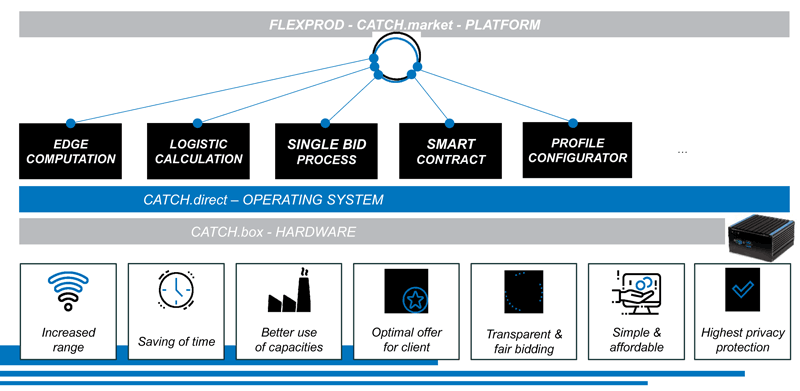by Thomas Lorünser (AIT), Niki Dürk (X-Net), Stephan Puxkandl (Ebner)
The FlexProd research project aims to develop a platform to improve the efficiency and speed of cross-company order allocation and processing in the manufacturing industry. The platform will help make production more flexible, facilitating cooperation between manufacturers and customers to enable a more agile and efficient manufacturing industry.
To serve its clients, the manufacturing industry must comply with production standards and defined delivery and production times. To ensure that production peaks and failures of individual plants can be managed, factories are designed with redundancies and parallelly equipped production lines. As a result, individual plants have a surplus of production capacity: in some cases up to 50 or 60% of idle capacity per year. At the same time, due to increasing digitalisation and cross-company value creation networks, demands on the manufacturing industry are increasing.
Improved internal and external communication can lead to more flexible, individual and efficient production of smaller batches – and ultimately a more competitive and sustainable economy. Processes and procedures for the simple, flexible and rapid placement and processing of orders and outsourcing are required in order to respond quickly to fluctuations in production capacity – bottlenecks or underutilisation – and to increase the overall efficiency of existing facilities.
FlexProd is a platform that is being developed to interface connecting clients and plant operators. The system will ensure fast processing of (supra-regional) projects and enable more efficient use of resources. Its design will be based on strong technical methods, strictly following security by design approaches [1].
The research and development of FlexProd is based on the following design paradigms:
- Intermediation: The rapid and (fully) automatic processing of orders is intended to reduce underutilised facilities, avoid vacancies and increase overall efficiency.
- Speed: Fast support for the duration of the contract means savings in time and money during sales transactions.
- Security: The producer should retain control of their data at all times; it must not leave the company in an unsecured form. The platform should also prevent competition analysis (e.g. machine types/equipment, capacities, prices).
- Transparency: Secure order processing should be achieved through the diversity of participants and previously known processing costs and methods. By disclosing the methods, processes, interfaces and software implementations, trust in the platform should be created.
- Additional service and benefits: The integration of additional services, such as insurance brokerage, financing, quality assurance and logistics, should provide the customer with additional benefits.
The platform architecture decentrally identifies the appropriate production plant and the matching service offer for orders to be awarded (MatchMaking). The industrial sector currently lacks comprehensive profiles for the representation of heterogeneous assets in terms of matchmaking technological and economic conditions. Formalisms for the interorganisational representation of MatchMaking assets on different levels of abstraction and multiple frameworks are needed. Additionally, there is a lack of decentralised recommendation mechanisms that allow an interorganisational coordination of outsourcing supply and demand. This task requires a hybrid MatchMaking solution with semantic similarity measures and dynamic trust mechanisms for binding matching of industrial assets.

Figure 1: Features of CATCH.direct platform as developed in FlexProd.
The platform supports customers and suppliers through the actual establishment of a transaction, without disclosing data inadvertently or divulging trade secrets (by providing a secure anonymous auction service). This is achieved through multiparty computation (MPC), which protects sensitive information while still participating in a common market place, leveraging an auction mechanism to determine the best market prices. However, because MPC technology does not scale well and is rather slow, carefully designed systems and protocols are required to handle larger marketplaces [2]. Furthermore, MPC can be extended using methods from verifiable computing, which improves the traceability for individual transactions without sacrificing the privacy of the data.
The integration of blockchain improves the traceability and transparency for trust and acceptance of the platform. The project’s approach is innovative in terms of its high degree of decentralisation and the development of security algorithms and standards to best protect sensitive business data (e.g., corporate data, production data or project calculations). The decentralised approach also makes it harder to assure the correct working of the system and provide auditing and verification means for market participants. Using a blockchain to log and trace transactions can increase the trustworthiness; however, deployment is an important issue to consider [3].
Nevertheless, it can also serve as a root of trust for the management of identities. It will be used for identity and key management to enable an open platform. Current developments, such as decentralised identifiers (DIDs), will be considered.
FlexProd is a joint effort between industry and academia and is being developed in consultation with all relevant stakeholders. It will contribute to a more agile and efficient manufacturing industry and lead to more efficient resource use, thus also contributing to the European Green Deal.
Links:
[L1] https://www.flexprod.at
[L2] https://catch.direct
References:
[1] P. Chiaro, et al: “Secure and privacy-friendly storage and data processing in the cloud”, IFIP Advances in Information and Communication Technology, 526, 153–169, 2018. https://doi.org/10.1007/978-3-319-92925-5_10
[2] T. Lorünser, F. Wohner: “Performance Comparison of Two Generic MPC-frameworks with Symmetric Ciphers”, in proc. 17th Int. Joint Conf. on E-Business and Telecommunications, 587–594. https://doi.org/10.5220/0009831705870594
[3] E. Framner, et al.:”Making secret sharing based cloud storage usable”, Information & Computer Security, 27(5), 647–667, 2019. https://doi.org/10.1108/ICS-01-2019-0016
Please contact:
Thomas Lorünser
AIT Austrian Institute of Technology GmbH











